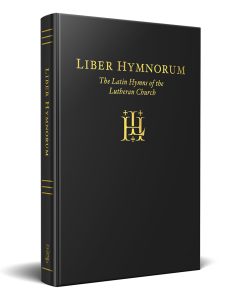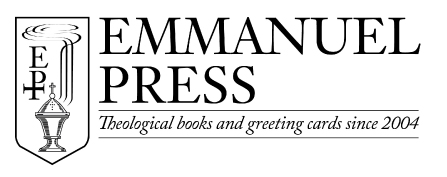 More from our interview with editor and translator Matthew Carver: “Basic instruction in Gregorian chant was not in view in this volume for a couple reasons: there are already great resources for it, and Liber Hymnorum was envisioned as a sort of supplement to other Lutheran chant resources already in use. That being said, anyone who knows how to read modern notation can use the music in the English section as a basis for learning all the Latin hymns and chants without knowledge of Gregorian chant, since they are (with few exceptions) largely the same, despite their different looks. So to keep down the size and price of the volume while simultaneously providing as many of these hymns and chants as possible, I’ve left instruction in Gregorian chant to others.
More from our interview with editor and translator Matthew Carver: “Basic instruction in Gregorian chant was not in view in this volume for a couple reasons: there are already great resources for it, and Liber Hymnorum was envisioned as a sort of supplement to other Lutheran chant resources already in use. That being said, anyone who knows how to read modern notation can use the music in the English section as a basis for learning all the Latin hymns and chants without knowledge of Gregorian chant, since they are (with few exceptions) largely the same, despite their different looks. So to keep down the size and price of the volume while simultaneously providing as many of these hymns and chants as possible, I’ve left instruction in Gregorian chant to others.
“First, if you have The Brotherhood Prayer Book and its accompanying CD, you already have a good introduction to Gregorian chant that will give you all you need to sing from the Latin section of Liber Hymnorum. (A Liber Hymnorum CD is also in the works!) There are several online resources, too, such as “An Idiot’s Guide to Square Notes” and the Corpus Christi Watershed site, which includes instruction and audio examples in How to Read and Sing Gregorian Chant. There is an active group on Facebook called “Gregorian Chant is for Everyone” as well as a group devoted to The Brotherhood Prayer Book (“Lutheran Liturgical Prayer Brotherhood”), where questions concerning chant can be answered. In short, there is little to keep people from learning to sing from Gregorian notation—in fact, once you get the basics from one of these resources, you find it really is simpler, more flexible, and more forgiving than standard modern notation!
“As far as Latin pronunciation is concerned, we’ve normalized the old Reformation-period spelling so that it can be pronounced according to the classical method or the Roman or German ecclesiastical (church Latin) method, though for the sake of rhyme the latter is preferred. Some instructions in pronouncing churchly Latin can be found here, and there is a good comparative table in the Wikipedia article “Latin regional pronunciation.” Students of Latin may find it best to use the accent familiar to them from their curriculum. In any case, when singing with others, it is wise to agree on the method of pronunciation beforehand!”


